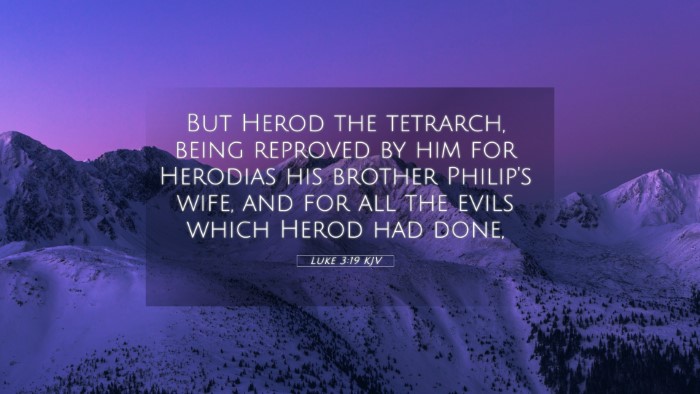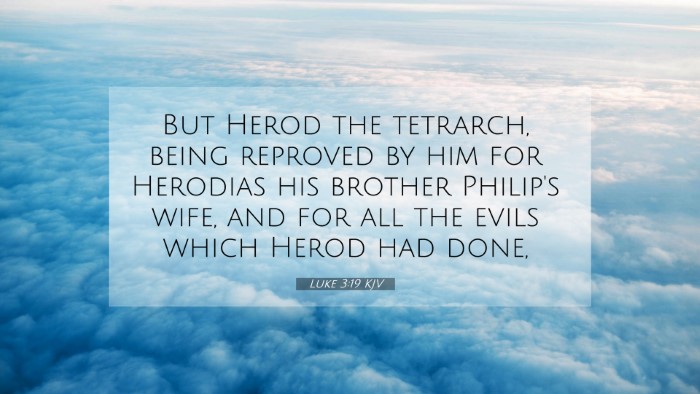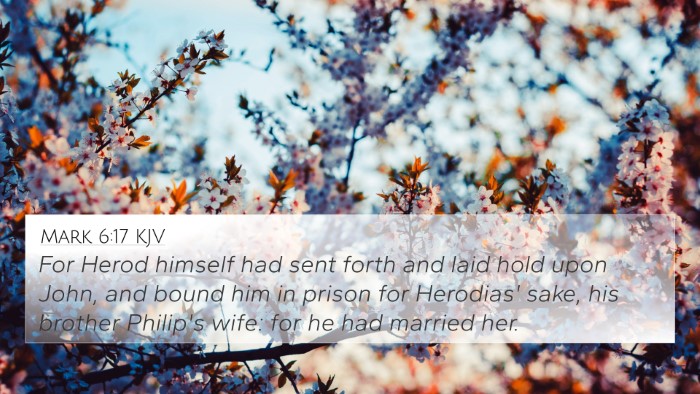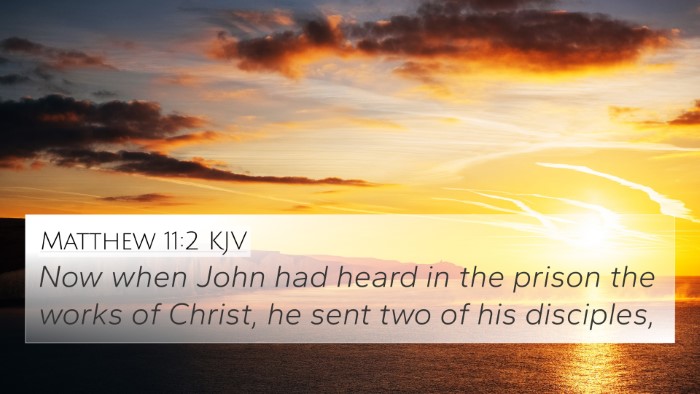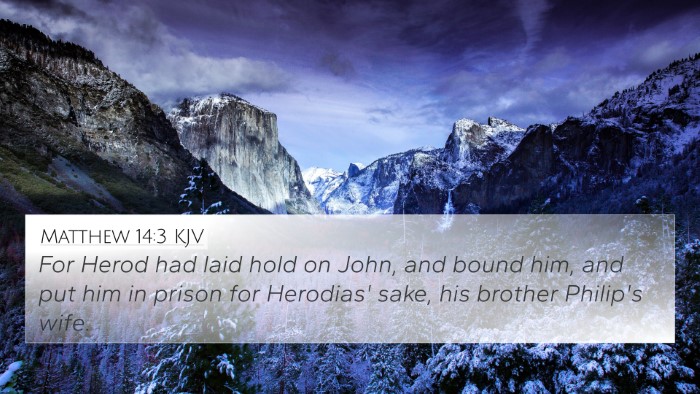Understanding Luke 3:19
The verse Luke 3:19 states: "But Herod the tetrarch, being reproved by him for Herodias his brother Philip's wife, and for all the evils which Herod had done," (KJV). This verse encapsulates the prophetic ministry of John the Baptist, particularly his boldness in calling out sin.
Context of Luke 3:19
This scripture occurs within the account of John the Baptist's ministry, focusing on his role in preparing the way for Jesus Christ. John's ministry was marked by his fierce admonition of sin, and specifically, in this verse, he rebukes Herod for his immoral relationship with Herodias, which was both unlawful and scandalous.
Interpretations from Public Domain Commentaries
-
Matthew Henry: Henry emphasizes John's prophetic courage, illustrating how he did not shy away from confronting power, even risking his safety. His rebuke serves not only as a moral correction but as a fulfillment of his role as a prophet in the lineage of the Old Testament.
-
Albert Barnes: Barnes points out that Herod's actions were not merely personal sins but had national implications, reflecting the moral decay of the leadership in that period. Barnes also notes how John represents the voice of righteousness amidst corruption.
-
Adam Clarke: Clarke elaborates on the historical context of Herod's reign, indicating that his marriage to Herodias was politically motivated and laden with immorality, in stark contrast to the expectations of the Jewish law. Clarke also assesses the implications of John's ministry for societal and spiritual renewal.
Significance of John's Reproof
John's rebuke highlights the significance of prophetic voices in society and the necessity of holding leaders accountable to moral standards. It showcases the theme that God's truth transcends human authority, and prophets are instruments of divine correction.
Lessons Learned
- Courage in Confrontation: Believers are called to speak truth into power and uphold morality.
- Accountability: Moral actions of leaders affect communities; thus, accountability is essential.
- Prophetic Tradition: John stands as a significant figure in the biblical tradition of prophets who confront injustice.
Bible Verse Cross-References
This verse connects to various other scripture passages, enhancing its thematic understanding:
- Matthew 14:3-4 - Details the reasons for John's imprisonment due to his rebuke of Herod.
- Mark 6:17-18 - A parallel account of John the Baptist's reproof of Herod and the consequences.
- Luke 7:29-30 - Explores the response of the people and their leaders to John's ministry.
- 2 Samuel 12:1-7 - Nathan's rebuke of David mirrors John's boldness in confronting sin.
- Ezekiel 3:17-19 - The responsibility of a watchman underscores the accountability of prophets.
- Ecclesiastes 8:2-5 - Discusses the importance of obedience to the king, contrasting with spiritual obligations.
- James 4:17 - Highlights the moral responsibility to act rightly when knowing what is right.
Thematic Bible Verse Connections
The themes of sin, accountability, and prophetic voices in the Bible create a rich tapestry of interconnectedness:
- Accountability to God: God's expectation for leaders is a continuous theme across the scriptures.
- The Role of Prophets: Both Old and New Testament prophets often faced persecution for their messages, exemplifying the cost of truth.
- Consequences of Sin: Herod's story serves as a warning of the eventual judgment that follows unrepentant sin.
Cross-Referencing Bible Study Methods
For those engaged in Bible study, understanding and utilizing cross-references can deepen one's comprehension of scripture.
- Identifying key themes: Look for recurring themes such as accountability and morality across different books.
- Consulting a concordance: Use a Bible concordance to quickly find related verses and themes.
- Utilizing margin notes: Many Bibles have built-in references; pay attention to these for cross-referencing.
- Creating cross-reference charts: Develop your own charts linking verses that speak on similar topics.
Conclusion
In conclusion, Luke 3:19 provides a profound insight into the life and ministry of John the Baptist, revealing the critical role of prophets in confronting sin and calling for repentance. This verse serves as a powerful reminder of the moral obligations of both leaders and followers. Through the act of cross-referencing with related scriptures, readers can gain a multifaceted understanding of this pivotal moment in biblical history.

